Comprehensive Report: Canadian Travel Industry Analysis
VerifiedAdded on 2022/08/15
|9
|1991
|7
Report
AI Summary
This report provides a detailed analysis of the Canadian travel and tourism industry. It begins with an overall industry scan, highlighting its economic contributions, employment opportunities, and global competitiveness. The report then delves into the legal regulations governing the industry, including the Canadian Tourism Commission Act, US Seller of Travel Laws, and provincial regulations related to travel agents and consumer protection. It examines the role of mass media, such as television, radio, and magazines, in promoting tourism and the impact of governmental interventions. Furthermore, the report explores the influence of digital media and social media platforms on the industry, including their role in influencing consumer decisions and facilitating bookings. Finally, it discusses the future of business communication, emphasizing content marketing and email marketing strategies. The report concludes with a summary of the key findings and references to supporting sources.
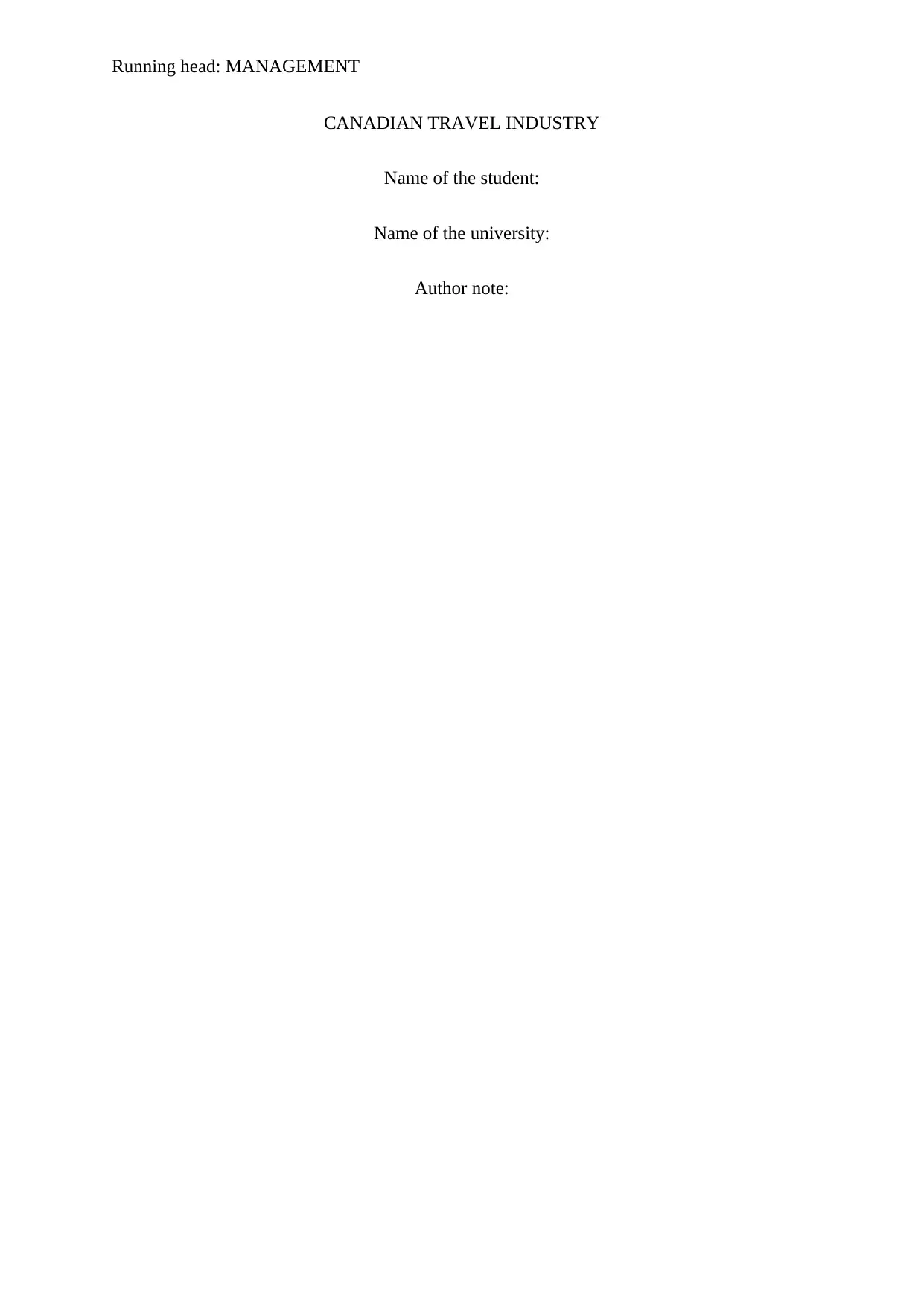
Running head: MANAGEMENT
CANADIAN TRAVEL INDUSTRY
Name of the student:
Name of the university:
Author note:
CANADIAN TRAVEL INDUSTRY
Name of the student:
Name of the university:
Author note:
Paraphrase This Document
Need a fresh take? Get an instant paraphrase of this document with our AI Paraphraser
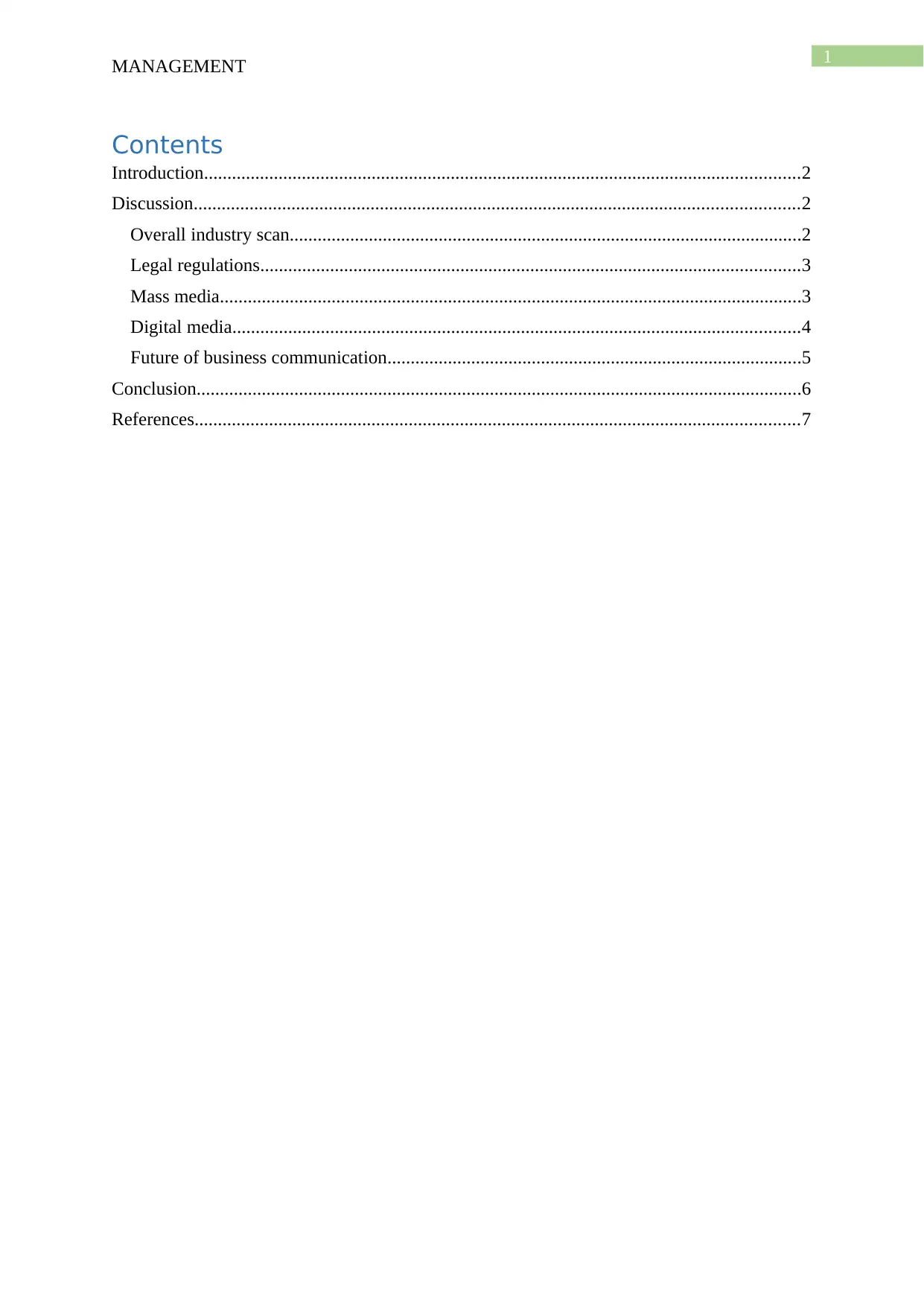
1
MANAGEMENT
Contents
Introduction................................................................................................................................2
Discussion..................................................................................................................................2
Overall industry scan..............................................................................................................2
Legal regulations....................................................................................................................3
Mass media.............................................................................................................................3
Digital media..........................................................................................................................4
Future of business communication.........................................................................................5
Conclusion..................................................................................................................................6
References..................................................................................................................................7
MANAGEMENT
Contents
Introduction................................................................................................................................2
Discussion..................................................................................................................................2
Overall industry scan..............................................................................................................2
Legal regulations....................................................................................................................3
Mass media.............................................................................................................................3
Digital media..........................................................................................................................4
Future of business communication.........................................................................................5
Conclusion..................................................................................................................................6
References..................................................................................................................................7
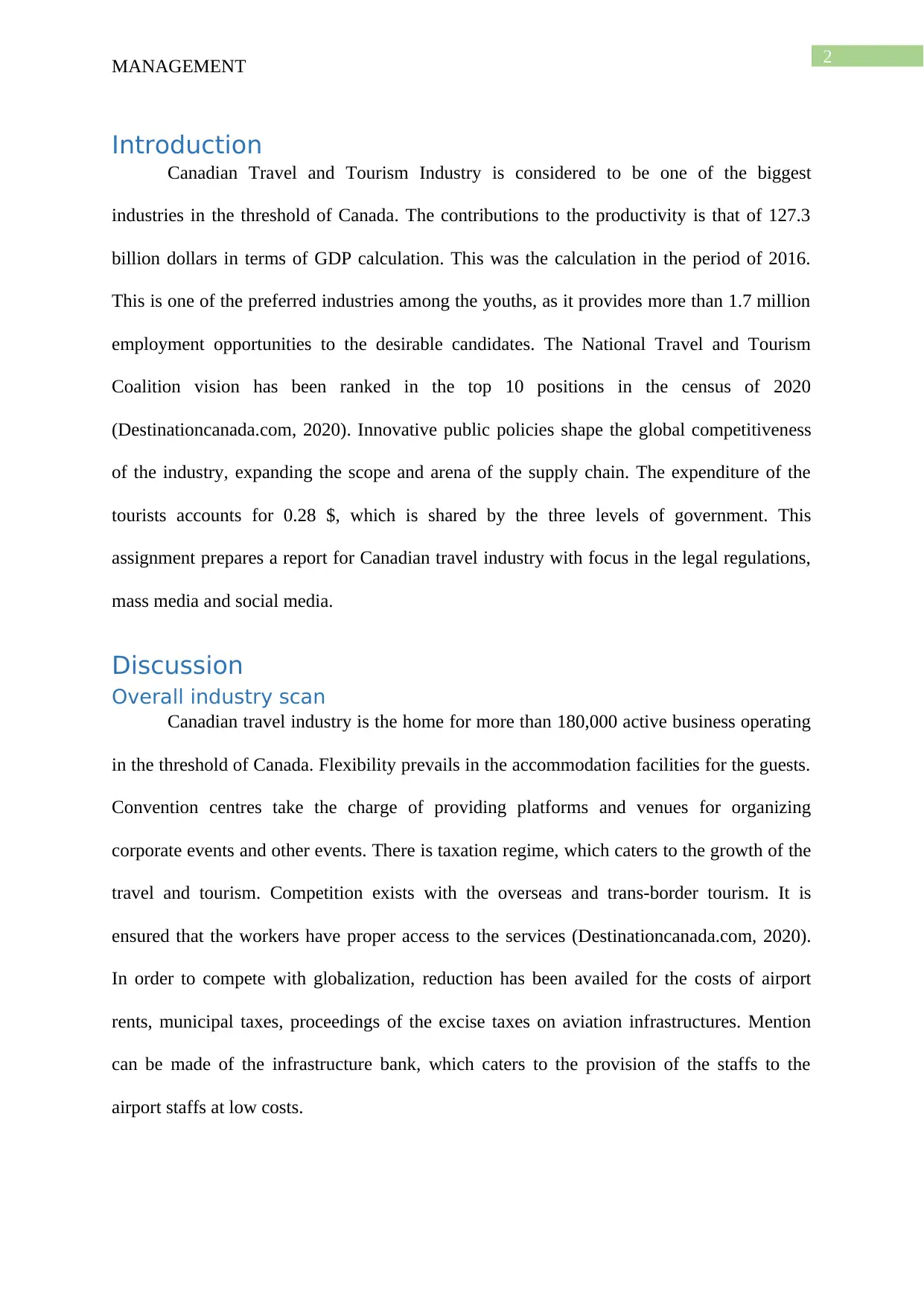
2
MANAGEMENT
Introduction
Canadian Travel and Tourism Industry is considered to be one of the biggest
industries in the threshold of Canada. The contributions to the productivity is that of 127.3
billion dollars in terms of GDP calculation. This was the calculation in the period of 2016.
This is one of the preferred industries among the youths, as it provides more than 1.7 million
employment opportunities to the desirable candidates. The National Travel and Tourism
Coalition vision has been ranked in the top 10 positions in the census of 2020
(Destinationcanada.com, 2020). Innovative public policies shape the global competitiveness
of the industry, expanding the scope and arena of the supply chain. The expenditure of the
tourists accounts for 0.28 $, which is shared by the three levels of government. This
assignment prepares a report for Canadian travel industry with focus in the legal regulations,
mass media and social media.
Discussion
Overall industry scan
Canadian travel industry is the home for more than 180,000 active business operating
in the threshold of Canada. Flexibility prevails in the accommodation facilities for the guests.
Convention centres take the charge of providing platforms and venues for organizing
corporate events and other events. There is taxation regime, which caters to the growth of the
travel and tourism. Competition exists with the overseas and trans-border tourism. It is
ensured that the workers have proper access to the services (Destinationcanada.com, 2020).
In order to compete with globalization, reduction has been availed for the costs of airport
rents, municipal taxes, proceedings of the excise taxes on aviation infrastructures. Mention
can be made of the infrastructure bank, which caters to the provision of the staffs to the
airport staffs at low costs.
MANAGEMENT
Introduction
Canadian Travel and Tourism Industry is considered to be one of the biggest
industries in the threshold of Canada. The contributions to the productivity is that of 127.3
billion dollars in terms of GDP calculation. This was the calculation in the period of 2016.
This is one of the preferred industries among the youths, as it provides more than 1.7 million
employment opportunities to the desirable candidates. The National Travel and Tourism
Coalition vision has been ranked in the top 10 positions in the census of 2020
(Destinationcanada.com, 2020). Innovative public policies shape the global competitiveness
of the industry, expanding the scope and arena of the supply chain. The expenditure of the
tourists accounts for 0.28 $, which is shared by the three levels of government. This
assignment prepares a report for Canadian travel industry with focus in the legal regulations,
mass media and social media.
Discussion
Overall industry scan
Canadian travel industry is the home for more than 180,000 active business operating
in the threshold of Canada. Flexibility prevails in the accommodation facilities for the guests.
Convention centres take the charge of providing platforms and venues for organizing
corporate events and other events. There is taxation regime, which caters to the growth of the
travel and tourism. Competition exists with the overseas and trans-border tourism. It is
ensured that the workers have proper access to the services (Destinationcanada.com, 2020).
In order to compete with globalization, reduction has been availed for the costs of airport
rents, municipal taxes, proceedings of the excise taxes on aviation infrastructures. Mention
can be made of the infrastructure bank, which caters to the provision of the staffs to the
airport staffs at low costs.
⊘ This is a preview!⊘
Do you want full access?
Subscribe today to unlock all pages.

Trusted by 1+ million students worldwide
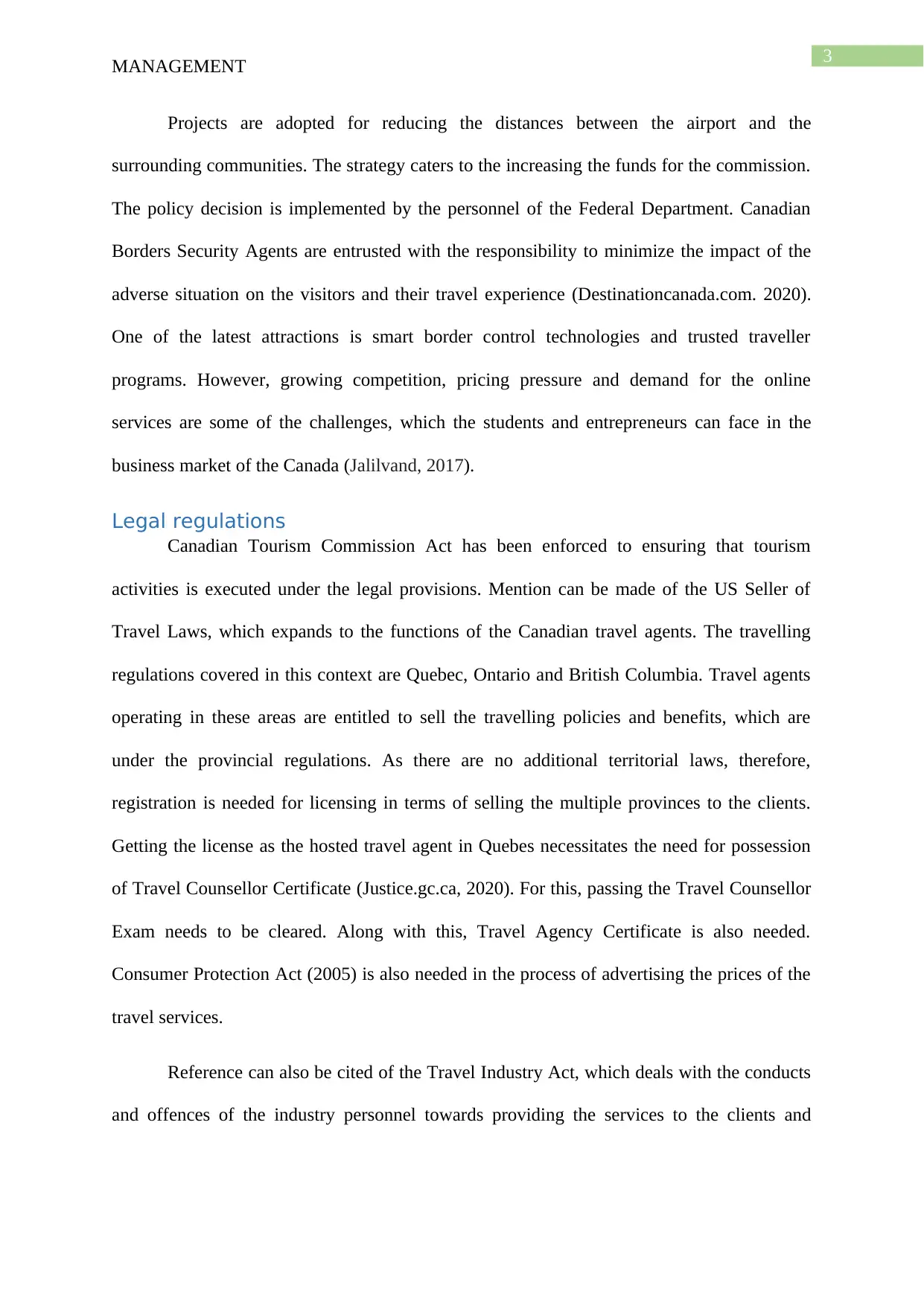
3
MANAGEMENT
Projects are adopted for reducing the distances between the airport and the
surrounding communities. The strategy caters to the increasing the funds for the commission.
The policy decision is implemented by the personnel of the Federal Department. Canadian
Borders Security Agents are entrusted with the responsibility to minimize the impact of the
adverse situation on the visitors and their travel experience (Destinationcanada.com. 2020).
One of the latest attractions is smart border control technologies and trusted traveller
programs. However, growing competition, pricing pressure and demand for the online
services are some of the challenges, which the students and entrepreneurs can face in the
business market of the Canada (Jalilvand, 2017).
Legal regulations
Canadian Tourism Commission Act has been enforced to ensuring that tourism
activities is executed under the legal provisions. Mention can be made of the US Seller of
Travel Laws, which expands to the functions of the Canadian travel agents. The travelling
regulations covered in this context are Quebec, Ontario and British Columbia. Travel agents
operating in these areas are entitled to sell the travelling policies and benefits, which are
under the provincial regulations. As there are no additional territorial laws, therefore,
registration is needed for licensing in terms of selling the multiple provinces to the clients.
Getting the license as the hosted travel agent in Quebes necessitates the need for possession
of Travel Counsellor Certificate (Justice.gc.ca, 2020). For this, passing the Travel Counsellor
Exam needs to be cleared. Along with this, Travel Agency Certificate is also needed.
Consumer Protection Act (2005) is also needed in the process of advertising the prices of the
travel services.
Reference can also be cited of the Travel Industry Act, which deals with the conducts
and offences of the industry personnel towards providing the services to the clients and
MANAGEMENT
Projects are adopted for reducing the distances between the airport and the
surrounding communities. The strategy caters to the increasing the funds for the commission.
The policy decision is implemented by the personnel of the Federal Department. Canadian
Borders Security Agents are entrusted with the responsibility to minimize the impact of the
adverse situation on the visitors and their travel experience (Destinationcanada.com. 2020).
One of the latest attractions is smart border control technologies and trusted traveller
programs. However, growing competition, pricing pressure and demand for the online
services are some of the challenges, which the students and entrepreneurs can face in the
business market of the Canada (Jalilvand, 2017).
Legal regulations
Canadian Tourism Commission Act has been enforced to ensuring that tourism
activities is executed under the legal provisions. Mention can be made of the US Seller of
Travel Laws, which expands to the functions of the Canadian travel agents. The travelling
regulations covered in this context are Quebec, Ontario and British Columbia. Travel agents
operating in these areas are entitled to sell the travelling policies and benefits, which are
under the provincial regulations. As there are no additional territorial laws, therefore,
registration is needed for licensing in terms of selling the multiple provinces to the clients.
Getting the license as the hosted travel agent in Quebes necessitates the need for possession
of Travel Counsellor Certificate (Justice.gc.ca, 2020). For this, passing the Travel Counsellor
Exam needs to be cleared. Along with this, Travel Agency Certificate is also needed.
Consumer Protection Act (2005) is also needed in the process of advertising the prices of the
travel services.
Reference can also be cited of the Travel Industry Act, which deals with the conducts
and offences of the industry personnel towards providing the services to the clients and
Paraphrase This Document
Need a fresh take? Get an instant paraphrase of this document with our AI Paraphraser
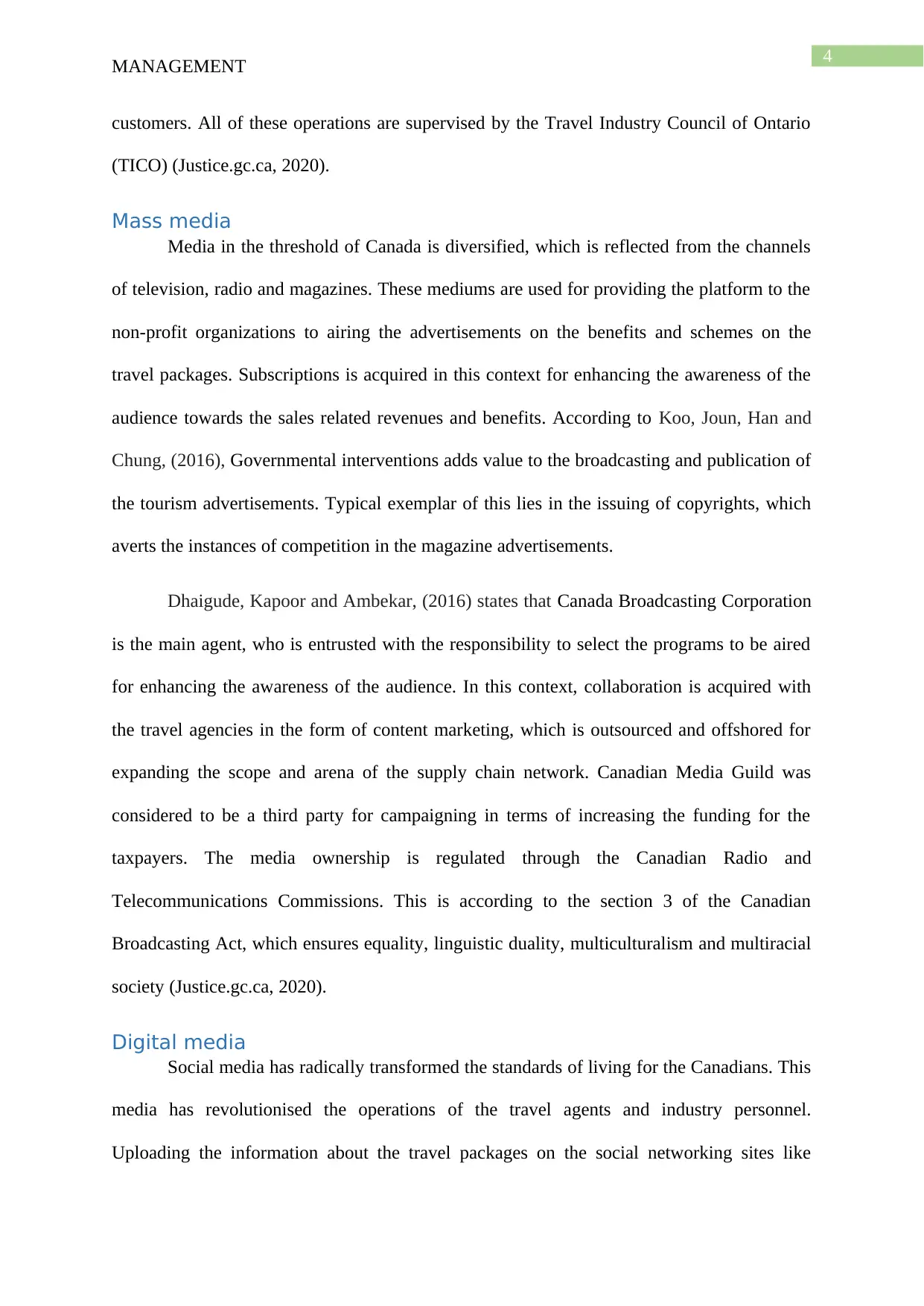
4
MANAGEMENT
customers. All of these operations are supervised by the Travel Industry Council of Ontario
(TICO) (Justice.gc.ca, 2020).
Mass media
Media in the threshold of Canada is diversified, which is reflected from the channels
of television, radio and magazines. These mediums are used for providing the platform to the
non-profit organizations to airing the advertisements on the benefits and schemes on the
travel packages. Subscriptions is acquired in this context for enhancing the awareness of the
audience towards the sales related revenues and benefits. According to Koo, Joun, Han and
Chung, (2016), Governmental interventions adds value to the broadcasting and publication of
the tourism advertisements. Typical exemplar of this lies in the issuing of copyrights, which
averts the instances of competition in the magazine advertisements.
Dhaigude, Kapoor and Ambekar, (2016) states that Canada Broadcasting Corporation
is the main agent, who is entrusted with the responsibility to select the programs to be aired
for enhancing the awareness of the audience. In this context, collaboration is acquired with
the travel agencies in the form of content marketing, which is outsourced and offshored for
expanding the scope and arena of the supply chain network. Canadian Media Guild was
considered to be a third party for campaigning in terms of increasing the funding for the
taxpayers. The media ownership is regulated through the Canadian Radio and
Telecommunications Commissions. This is according to the section 3 of the Canadian
Broadcasting Act, which ensures equality, linguistic duality, multiculturalism and multiracial
society (Justice.gc.ca, 2020).
Digital media
Social media has radically transformed the standards of living for the Canadians. This
media has revolutionised the operations of the travel agents and industry personnel.
Uploading the information about the travel packages on the social networking sites like
MANAGEMENT
customers. All of these operations are supervised by the Travel Industry Council of Ontario
(TICO) (Justice.gc.ca, 2020).
Mass media
Media in the threshold of Canada is diversified, which is reflected from the channels
of television, radio and magazines. These mediums are used for providing the platform to the
non-profit organizations to airing the advertisements on the benefits and schemes on the
travel packages. Subscriptions is acquired in this context for enhancing the awareness of the
audience towards the sales related revenues and benefits. According to Koo, Joun, Han and
Chung, (2016), Governmental interventions adds value to the broadcasting and publication of
the tourism advertisements. Typical exemplar of this lies in the issuing of copyrights, which
averts the instances of competition in the magazine advertisements.
Dhaigude, Kapoor and Ambekar, (2016) states that Canada Broadcasting Corporation
is the main agent, who is entrusted with the responsibility to select the programs to be aired
for enhancing the awareness of the audience. In this context, collaboration is acquired with
the travel agencies in the form of content marketing, which is outsourced and offshored for
expanding the scope and arena of the supply chain network. Canadian Media Guild was
considered to be a third party for campaigning in terms of increasing the funding for the
taxpayers. The media ownership is regulated through the Canadian Radio and
Telecommunications Commissions. This is according to the section 3 of the Canadian
Broadcasting Act, which ensures equality, linguistic duality, multiculturalism and multiracial
society (Justice.gc.ca, 2020).
Digital media
Social media has radically transformed the standards of living for the Canadians. This
media has revolutionised the operations of the travel agents and industry personnel.
Uploading the information about the travel packages on the social networking sites like
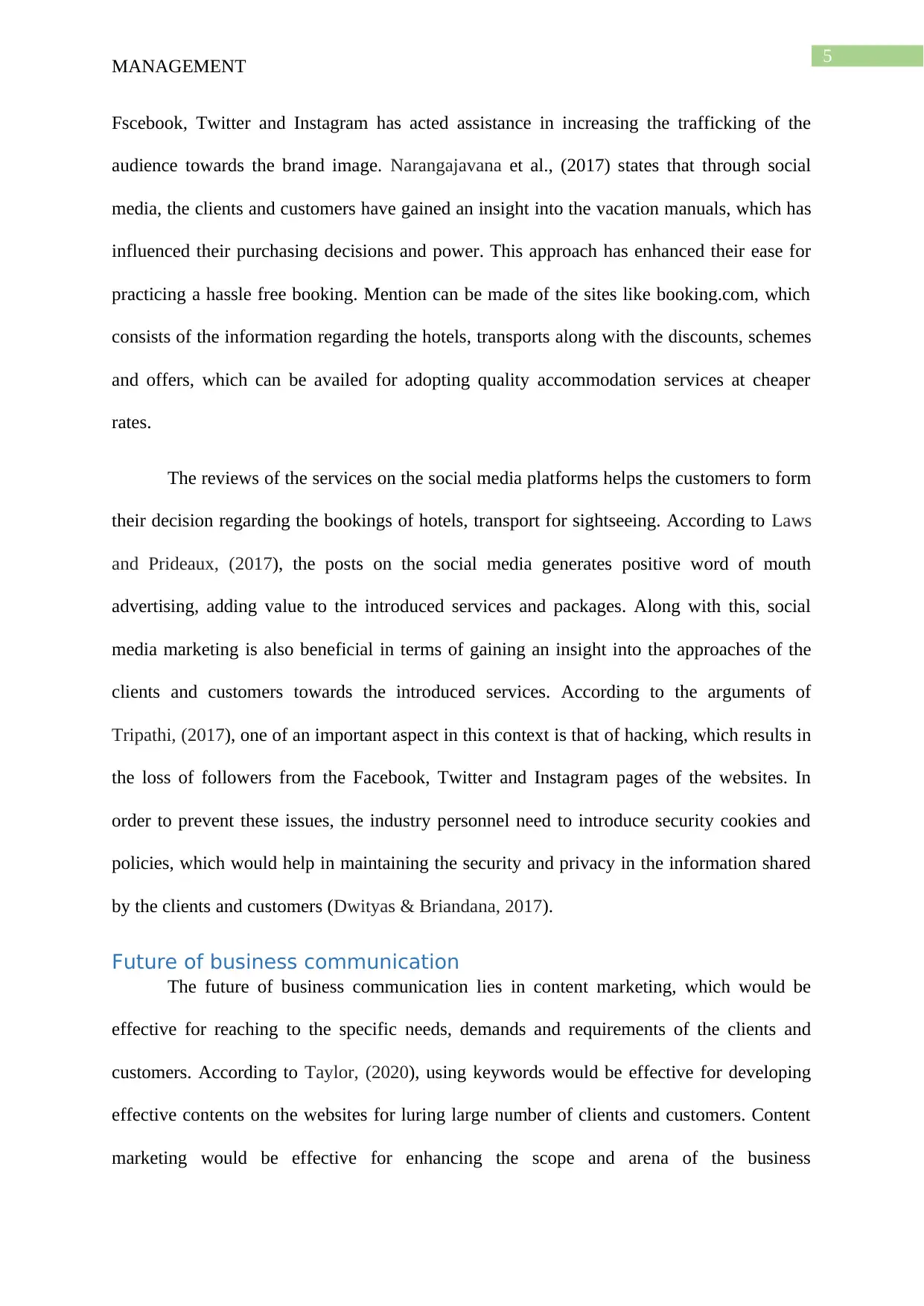
5
MANAGEMENT
Fscebook, Twitter and Instagram has acted assistance in increasing the trafficking of the
audience towards the brand image. Narangajavana et al., (2017) states that through social
media, the clients and customers have gained an insight into the vacation manuals, which has
influenced their purchasing decisions and power. This approach has enhanced their ease for
practicing a hassle free booking. Mention can be made of the sites like booking.com, which
consists of the information regarding the hotels, transports along with the discounts, schemes
and offers, which can be availed for adopting quality accommodation services at cheaper
rates.
The reviews of the services on the social media platforms helps the customers to form
their decision regarding the bookings of hotels, transport for sightseeing. According to Laws
and Prideaux, (2017), the posts on the social media generates positive word of mouth
advertising, adding value to the introduced services and packages. Along with this, social
media marketing is also beneficial in terms of gaining an insight into the approaches of the
clients and customers towards the introduced services. According to the arguments of
Tripathi, (2017), one of an important aspect in this context is that of hacking, which results in
the loss of followers from the Facebook, Twitter and Instagram pages of the websites. In
order to prevent these issues, the industry personnel need to introduce security cookies and
policies, which would help in maintaining the security and privacy in the information shared
by the clients and customers (Dwityas & Briandana, 2017).
Future of business communication
The future of business communication lies in content marketing, which would be
effective for reaching to the specific needs, demands and requirements of the clients and
customers. According to Taylor, (2020), using keywords would be effective for developing
effective contents on the websites for luring large number of clients and customers. Content
marketing would be effective for enhancing the scope and arena of the business
MANAGEMENT
Fscebook, Twitter and Instagram has acted assistance in increasing the trafficking of the
audience towards the brand image. Narangajavana et al., (2017) states that through social
media, the clients and customers have gained an insight into the vacation manuals, which has
influenced their purchasing decisions and power. This approach has enhanced their ease for
practicing a hassle free booking. Mention can be made of the sites like booking.com, which
consists of the information regarding the hotels, transports along with the discounts, schemes
and offers, which can be availed for adopting quality accommodation services at cheaper
rates.
The reviews of the services on the social media platforms helps the customers to form
their decision regarding the bookings of hotels, transport for sightseeing. According to Laws
and Prideaux, (2017), the posts on the social media generates positive word of mouth
advertising, adding value to the introduced services and packages. Along with this, social
media marketing is also beneficial in terms of gaining an insight into the approaches of the
clients and customers towards the introduced services. According to the arguments of
Tripathi, (2017), one of an important aspect in this context is that of hacking, which results in
the loss of followers from the Facebook, Twitter and Instagram pages of the websites. In
order to prevent these issues, the industry personnel need to introduce security cookies and
policies, which would help in maintaining the security and privacy in the information shared
by the clients and customers (Dwityas & Briandana, 2017).
Future of business communication
The future of business communication lies in content marketing, which would be
effective for reaching to the specific needs, demands and requirements of the clients and
customers. According to Taylor, (2020), using keywords would be effective for developing
effective contents on the websites for luring large number of clients and customers. Content
marketing would be effective for enhancing the scope and arena of the business
⊘ This is a preview!⊘
Do you want full access?
Subscribe today to unlock all pages.

Trusted by 1+ million students worldwide
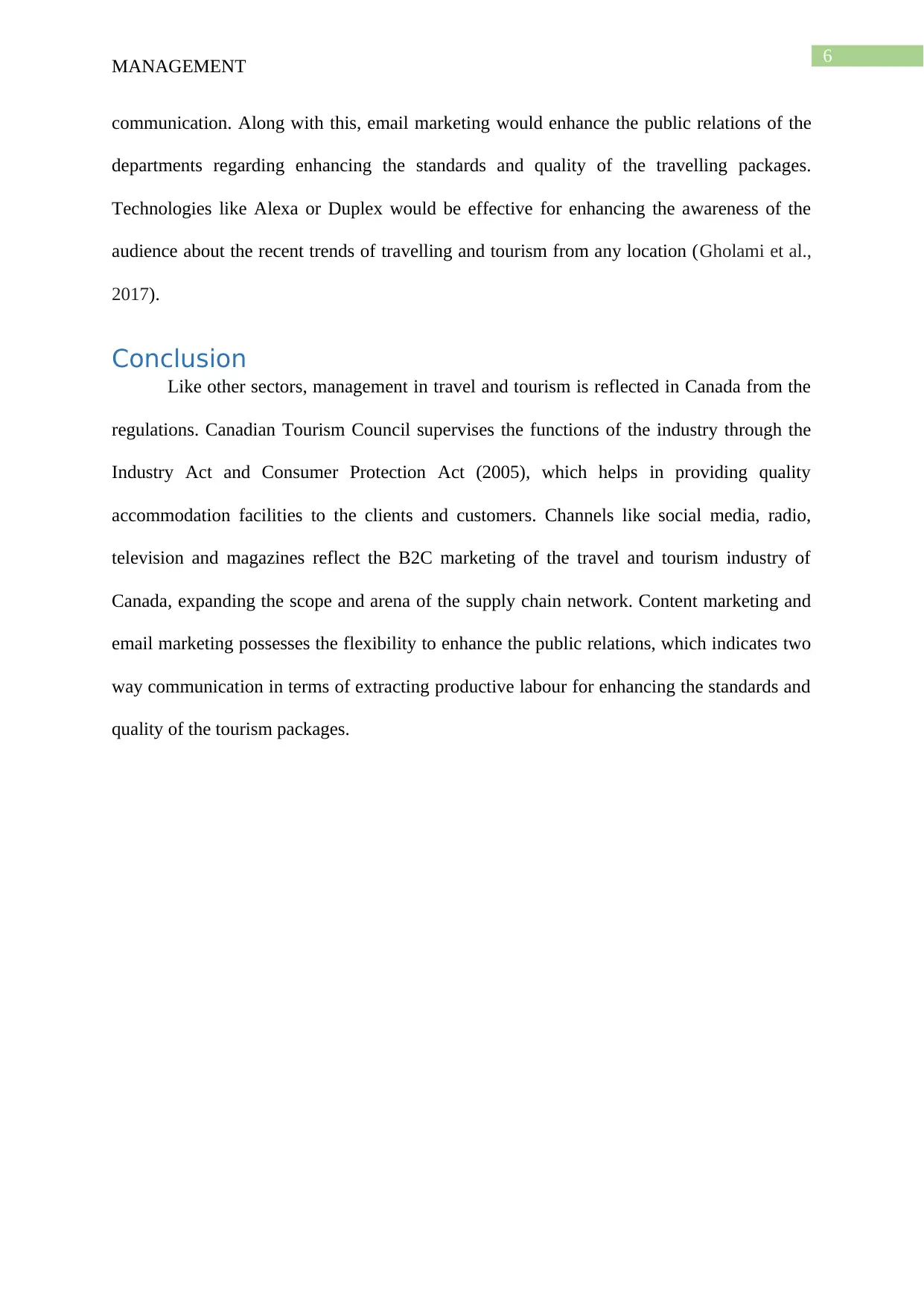
6
MANAGEMENT
communication. Along with this, email marketing would enhance the public relations of the
departments regarding enhancing the standards and quality of the travelling packages.
Technologies like Alexa or Duplex would be effective for enhancing the awareness of the
audience about the recent trends of travelling and tourism from any location (Gholami et al.,
2017).
Conclusion
Like other sectors, management in travel and tourism is reflected in Canada from the
regulations. Canadian Tourism Council supervises the functions of the industry through the
Industry Act and Consumer Protection Act (2005), which helps in providing quality
accommodation facilities to the clients and customers. Channels like social media, radio,
television and magazines reflect the B2C marketing of the travel and tourism industry of
Canada, expanding the scope and arena of the supply chain network. Content marketing and
email marketing possesses the flexibility to enhance the public relations, which indicates two
way communication in terms of extracting productive labour for enhancing the standards and
quality of the tourism packages.
MANAGEMENT
communication. Along with this, email marketing would enhance the public relations of the
departments regarding enhancing the standards and quality of the travelling packages.
Technologies like Alexa or Duplex would be effective for enhancing the awareness of the
audience about the recent trends of travelling and tourism from any location (Gholami et al.,
2017).
Conclusion
Like other sectors, management in travel and tourism is reflected in Canada from the
regulations. Canadian Tourism Council supervises the functions of the industry through the
Industry Act and Consumer Protection Act (2005), which helps in providing quality
accommodation facilities to the clients and customers. Channels like social media, radio,
television and magazines reflect the B2C marketing of the travel and tourism industry of
Canada, expanding the scope and arena of the supply chain network. Content marketing and
email marketing possesses the flexibility to enhance the public relations, which indicates two
way communication in terms of extracting productive labour for enhancing the standards and
quality of the tourism packages.
Paraphrase This Document
Need a fresh take? Get an instant paraphrase of this document with our AI Paraphraser
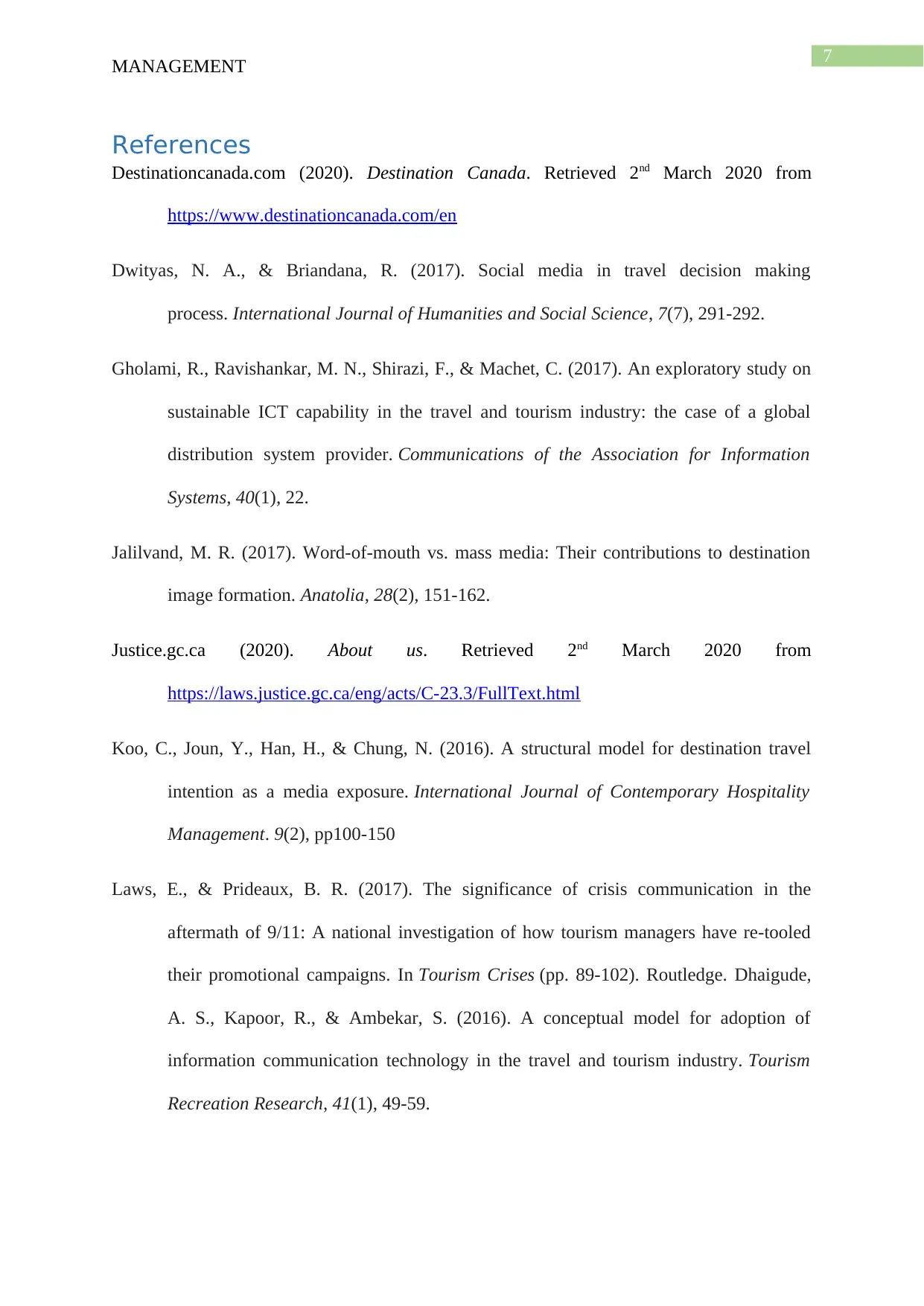
7
MANAGEMENT
References
Destinationcanada.com (2020). Destination Canada. Retrieved 2nd March 2020 from
https://www.destinationcanada.com/en
Dwityas, N. A., & Briandana, R. (2017). Social media in travel decision making
process. International Journal of Humanities and Social Science, 7(7), 291-292.
Gholami, R., Ravishankar, M. N., Shirazi, F., & Machet, C. (2017). An exploratory study on
sustainable ICT capability in the travel and tourism industry: the case of a global
distribution system provider. Communications of the Association for Information
Systems, 40(1), 22.
Jalilvand, M. R. (2017). Word-of-mouth vs. mass media: Their contributions to destination
image formation. Anatolia, 28(2), 151-162.
Justice.gc.ca (2020). About us. Retrieved 2nd March 2020 from
https://laws.justice.gc.ca/eng/acts/C-23.3/FullText.html
Koo, C., Joun, Y., Han, H., & Chung, N. (2016). A structural model for destination travel
intention as a media exposure. International Journal of Contemporary Hospitality
Management. 9(2), pp100-150
Laws, E., & Prideaux, B. R. (2017). The significance of crisis communication in the
aftermath of 9/11: A national investigation of how tourism managers have re-tooled
their promotional campaigns. In Tourism Crises (pp. 89-102). Routledge. Dhaigude,
A. S., Kapoor, R., & Ambekar, S. (2016). A conceptual model for adoption of
information communication technology in the travel and tourism industry. Tourism
Recreation Research, 41(1), 49-59.
MANAGEMENT
References
Destinationcanada.com (2020). Destination Canada. Retrieved 2nd March 2020 from
https://www.destinationcanada.com/en
Dwityas, N. A., & Briandana, R. (2017). Social media in travel decision making
process. International Journal of Humanities and Social Science, 7(7), 291-292.
Gholami, R., Ravishankar, M. N., Shirazi, F., & Machet, C. (2017). An exploratory study on
sustainable ICT capability in the travel and tourism industry: the case of a global
distribution system provider. Communications of the Association for Information
Systems, 40(1), 22.
Jalilvand, M. R. (2017). Word-of-mouth vs. mass media: Their contributions to destination
image formation. Anatolia, 28(2), 151-162.
Justice.gc.ca (2020). About us. Retrieved 2nd March 2020 from
https://laws.justice.gc.ca/eng/acts/C-23.3/FullText.html
Koo, C., Joun, Y., Han, H., & Chung, N. (2016). A structural model for destination travel
intention as a media exposure. International Journal of Contemporary Hospitality
Management. 9(2), pp100-150
Laws, E., & Prideaux, B. R. (2017). The significance of crisis communication in the
aftermath of 9/11: A national investigation of how tourism managers have re-tooled
their promotional campaigns. In Tourism Crises (pp. 89-102). Routledge. Dhaigude,
A. S., Kapoor, R., & Ambekar, S. (2016). A conceptual model for adoption of
information communication technology in the travel and tourism industry. Tourism
Recreation Research, 41(1), 49-59.
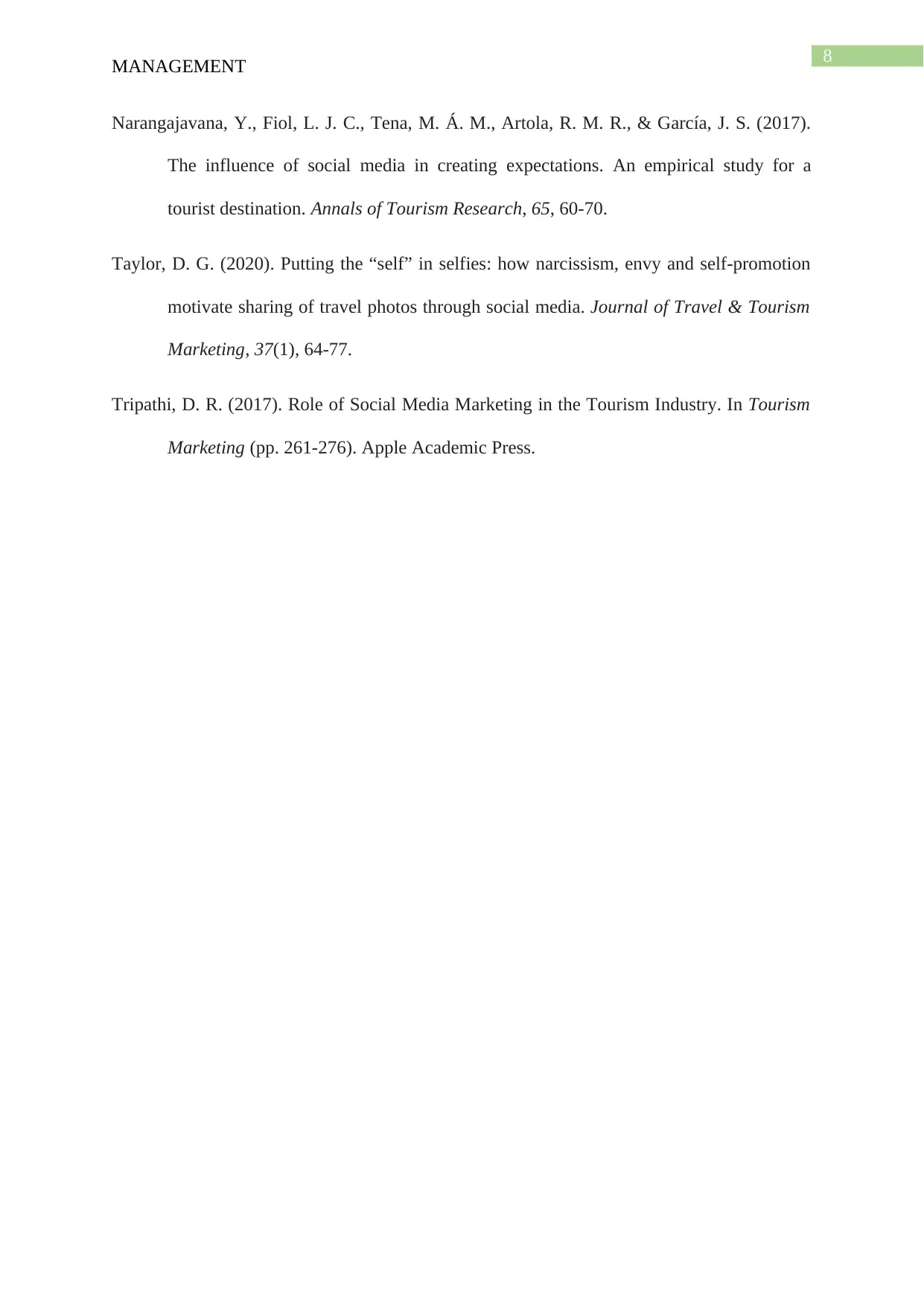
8
MANAGEMENT
Narangajavana, Y., Fiol, L. J. C., Tena, M. Á. M., Artola, R. M. R., & García, J. S. (2017).
The influence of social media in creating expectations. An empirical study for a
tourist destination. Annals of Tourism Research, 65, 60-70.
Taylor, D. G. (2020). Putting the “self” in selfies: how narcissism, envy and self-promotion
motivate sharing of travel photos through social media. Journal of Travel & Tourism
Marketing, 37(1), 64-77.
Tripathi, D. R. (2017). Role of Social Media Marketing in the Tourism Industry. In Tourism
Marketing (pp. 261-276). Apple Academic Press.
MANAGEMENT
Narangajavana, Y., Fiol, L. J. C., Tena, M. Á. M., Artola, R. M. R., & García, J. S. (2017).
The influence of social media in creating expectations. An empirical study for a
tourist destination. Annals of Tourism Research, 65, 60-70.
Taylor, D. G. (2020). Putting the “self” in selfies: how narcissism, envy and self-promotion
motivate sharing of travel photos through social media. Journal of Travel & Tourism
Marketing, 37(1), 64-77.
Tripathi, D. R. (2017). Role of Social Media Marketing in the Tourism Industry. In Tourism
Marketing (pp. 261-276). Apple Academic Press.
⊘ This is a preview!⊘
Do you want full access?
Subscribe today to unlock all pages.

Trusted by 1+ million students worldwide
1 out of 9
Your All-in-One AI-Powered Toolkit for Academic Success.
+13062052269
info@desklib.com
Available 24*7 on WhatsApp / Email
![[object Object]](/_next/static/media/star-bottom.7253800d.svg)
Unlock your academic potential
Copyright © 2020–2025 A2Z Services. All Rights Reserved. Developed and managed by ZUCOL.